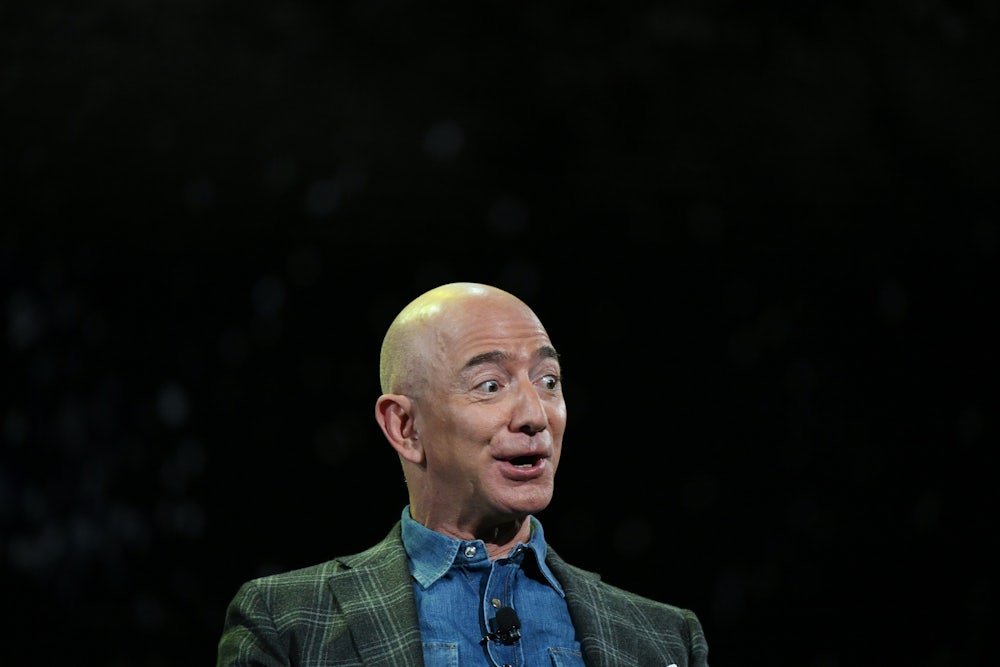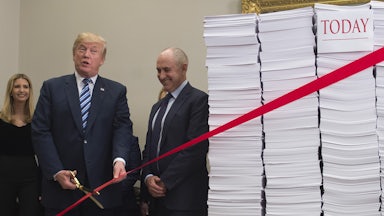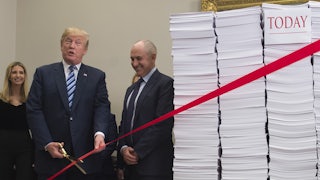America’s economic overlords offered their first-quarter earnings reports yesterday, and the news is, as expected, good for Silicon Valley. Beyond good, in fact. The country’s tech industry is taking in unprecedented amounts of money—“bonkers dollars,” as The New York Times described it. Facebook doubled its profits; Microsoft increased its cloud business revenue by 50 percent; Apple’s iPhone sales boomed from about $29 billion to $48 billion; and Amazon, king of kings in this group, reported $108.5 billion in quarterly earnings, an increase of 44 percent from the previous year. Even lesser-known entities like Shopify, which provides software for online merchants, are on a tear.
The pandemic’s catastrophic economic fallout has been cushioned, in part, by government assistance that has been wonderfully effective in temporarily ameliorating poverty. But the post-Covid-19 economic recovery also shows signs of being K-shaped—that is, benefiting those in the middle and upper classes, whose industries are rebounding rapidly, while millions of people fall deeper into debt, rely on precarious gig work, and see no benefits from a robust stock market. Peter Atwater, who helped popularize the concept of a K-shaped recovery, recently told an interviewer that “for people who were able to pivot to working from home, their confidence immediately began to rebound. For everyone else, it was not getting better, and in many cases—particularly for those in the hospitality and travel industry—it was getting worse.”
This contrast—between overwhelming tech riches and an increasingly precarious working class relying on occasional infusions of governmental generosity—reveals the hole at the heart of American economy policy. And it can’t be fixed with another round of $1,600 checks or by putting more cash in Mark Zuckerberg’s pockets. It’s time to tax the hell out of the titans of the pandemic.
For the last 40 years, successive presidential administrations have chipped away at social benefits while simultaneously chiseling down corporate and individual tax rates to unsustainable levels. The result is a U.S. corporate tax rate of 21 percent that still, to some members of an increasingly radicalized Republican right, seems excessive. (Some of America’s biggest corporations pay no tax at all.) Even so, the Biden administration is working to raise corporate tax rates to 28 percent at home while negotiating with the 140 members of the Organization for Economic Cooperation and Development to establish a minimum global corporate tax rate—which would, among other benefits, stop giant tech companies from funneling their operations through tax-friendly Ireland.
Tech companies’ mind-boggling profits owe something to the fact that quarantine and work-from-home measures essentially funneled them millions of new customers. But it wasn’t just Zoom and Facebook and DoorDash finding new business. Billionaire wealth rose by approximately 54 percent—$4 trillion—during the pandemic; the overall number of billionaires increased by 30 percent. Real estate and stocks soared, with many of the ultrarich only needing to watch the numbers in their portfolios go up. To say then that Jeff Bezos “worked” for his $177 billion—rather than the beleaguered warehouse employees subject to backbreaking conditions and hardline union-busting campaigns—is to totally misunderstand how wealth is created and who should share in a company’s good fortune.
From supporting the PRO Act to raising corporate tax rates to offering direct financial payments, the Biden administration seems to have some sense of what would make for a sustainable economic recovery. It requires a redistribution of wealth and providing permanent, reliable benefits enshrined in law. At the same time, those in power seem to have little desire to expand Medicare, which should be one of the chief lessons of a public health crisis that laid bare the brokenness of our for-profit health care system. “The pandemic has demonstrated how badly [health care] is needed,” said Biden in his address to Congress this week, calling it a human right. Yet he still offers no plan to provide universal, free coverage.
Some pundits have reached for optimistic historical comparisons to FDR or Johnson’s Great Society programs, but there is still a Gilded Age quality to the administration’s modest reforms, a sense that it is pacifying a discontented mob (or maybe just difficult-to-please Democratic senators like Joe Manchin) with insufficient measures. As Silicon Valley’s record profits show, our country’s economic planners are simply not doing enough to fundamentally change the balance of power, especially against monopolistic tech companies that sometimes resemble nation-states more than conventional businesses. Absent trust-busting; tax increases on private wealth and corporate incomes; and substantial increases in the minimum wage, social services, health care, and climate change mitigation, our economic recovery is likely to continue to be horribly askew. As Peter Atwater, the economist behind the K-shaped recovery concept, recently said, the pandemic “stacked inequity on one side and stacked privilege on the other.” It’s time to take on both.








